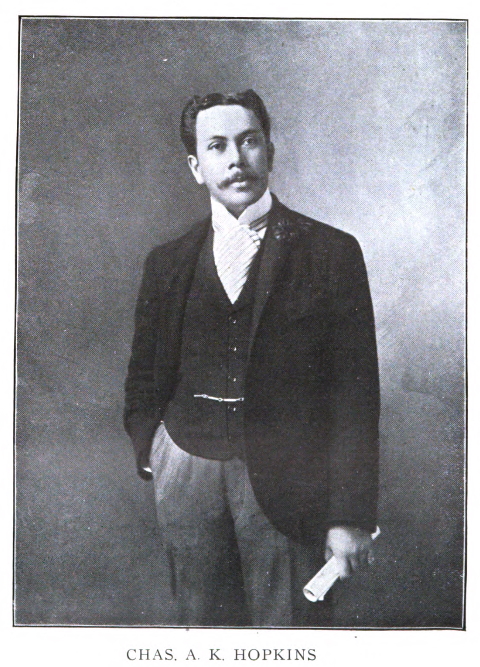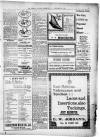|
Composers of Hawaiian Language Songs | A
community service by Mondoy Music |
Charles A.K. Hopkins (1874-1922)
(created Feb 21, 2020 by R. Mondoy)
GENERAL
Charles Augustus K.
Hopkins was born in in Kohala, Hawaiʻi in May 4, 1876, the son of Charles L. Hopkins (1853-1918) and
Abigail Aiwohi Hopkins (1857-1942) His father was a marshal for the
Hawaiʻi judicial system under King Kalākaua, and served as a court
translator during the subsequent territorial government.1
His mother was a member of the royal court for both King Kalākaua and
Queen Liliʻuokalani.2
Charles attended St. Louis College, at that time with over 500 students.
He graduated (aged 18) in 1894. He then worked for Bergstrom Music Store
in Honolulu. In 1899 Charles printed the “Aloha Collection of Hawaiian
Songs,” (Oliver Ditson, Boston), the first such collection of Hawaiian
language songs. I surmise that he was keenly interested in placing
Hawaii on the musical international map right about the time when
Hawaiian music and musicians were becoming very popular in the
continental USA and abroad. His wife's name was Lola Kahailiopua
Hopkins.4 After his stint with
Bergstrom Music he worked as a bailiff for the courst system and also
did real estate.3
He died on June 20, 1922, aged 46, in Honolulu.4
footnotes:
1 obits
for Charles L. Hopkins (1918) and Abigail Hopkins (1942)l
2 obit
Abigail Hopkins (1942)
3
real estate ad (19teens) in Ka Nupepa Kuakoa
4 Ancestry.com
HOPKINS and the ALOHA COLLECTION OF
HAWAIIAN SONGS (1899).
The collection contained 43 songs in
Hawaiian text and singable English renditions of the Hawaiian as well
and piano accompaniment. It contained songs that were already famous in
Hawaii (and abroad) at the time, along with other works more peculiarly
known to Hawaiian audiences. There were several re-prints of the
collection, the last being in 1928.
From his preface to the
collection (sic):
"In the songs and melodies of a nation are
reflected the sentiments and characteristics of the people; their
harmonies are struck from the heart strings. Especially is this is so of
the songs in the HAWAIIAN race, upon whom the hand of destiny is
enforcing changes which will soon entune their natural musical
capacities to the songs of other lands. Before those good old melodies
pass away it ma be interesting to many if an effort be made to preserve
them. In the “ALOHA COLLECTION OF HAWAIIAN SONGS” I have endeavored to
select those of the highest and most representative type of our
melodies. They forma a rare and unique selection of the songs of the
best recognized Hawaiian composers. It will be noticed that seven of the
compositions are by members of the royal family of Hawaii, - Queen
Liliuokalani, King Kalakaua, Prince Leleliohoku, and Princess Likelike,
- recognized authorities on Hawaiian music. While the Latin-like
softness of the Hawaiian pronunciation suits the melodies better that
the less musical English, the latter text has been added for the benefit
of those not familiar with the original. CHARLES A. K. HOPKINS, Editor
and Arranger, HONOULU, T.H."
Seemingly ambitious and musicallly
gifted, this project of his was started sometime after 1894 and
completed in 1899 with its publication. I doubt that he composed any of
the tunes in the collection. Some of the tune authors in his book are
certainly mis-ascribed. As the editor/publisher/investor his primary
task may been to commission typesetting and having accompaniments and
vocal parts arranged. On the other hand, he may have been competent
enough to do that work himself. Moreover, the English song texts seem to
be rather faithful to the original Hawaiian meaning. In places
where the Hawaiian is too “risque” for late 19th c. tastes, a
mollified/romanticized translation appears. Probably fluent in Hawaiian
(like his parents) he could have authored the English for most, if not
all, of the published songs. The collection normally acknowledges on the
first page of each song the text-author on the left, and the composer OR
music arranger (i.e. vocal parts, piano acc.) on the right. Often there
is no acknowledgment in that right slot.
Some general
assumptions on my part:
1. We might safely presume that songs earlier
found in the 1888 KHHH (=“Ka Hoonanea o na Home Hawaii” Keakaokalani &
Bright) also had pre-1888 text and melody sources. Same for the songs
earlier listed in the 1897 texts of KBMH: (=“Ka Buke Mele o na Himeni
Hawaii Holstein) as having pre-1897 text and melody sources.
2. Some
songs were obviously the work of other composers
3. Copyright
procedures during the day (given the immense marketability of Hawaii
music then) probably led Hopkins and his collaborators (if any) to the
collections’ manner of text and tune crediting and copyright ownership.
Back then it was safer to copyright in any manner possible ahead of time
before less scrupulous entrepreneurs claimed ownership to get in on the
potential financial rewards.
NEWSPAPER ARTICLES / BOOKS
about Hopkins during his lifetime

Ka Nupepa Kuokoa, Volume XXXVIII, Number 39, 29 September, pg 2
[ARTICLE]
Translation pending (by rmm)

The Evening Bulletin, 27 September, 1899, Honolulu H.I.
[ADVERTISEMENTS]; click to enlarge; note column 1 bottom and column 4
middle)
from: Popular American Composers by Frank L. Boyden
(pub. Herbert H. Taylor, New York,) (1902) pg. 1341904?? (sic)
"Charles A. K. Hopkins may be justly called an Hawaiian-American; and
this, for two distinct reasons viz:-Hawaiian, because born of Hawaiian
parents, and American because a citizen of the United States.
This
young author, publisher and song-writer was born in Honolulu, Island of
Oahu, Territory of Hawaii, May 4, 1876.
At the age of 18 he graduated
from St. Louis College, a local institution, having a daily attendance
of 500 and more students. Leaving college he entered the employ of a
leading music store of Hawaii's capital city Honolulu, publishing while
there a native ballad of exquisite beauty entitled “Forget me-not,”
which found immediate favor. His next publication was a march song
entitled “Maui,” a song of flowing rhythm and winning melody. This young
Hawaiian-American, however, has won his great fame and popularity from
his “Aloha Collection of Hawaiian Songs,” being the author, proprietor
and publisher thereof. It is the first and only publication of the kind
in the world; an English edition of these beautiful, weird and pathetic
melodies of Uncle Sam's new Pacific possessions in now in course of
preparation for publication, and will be an edition specially dedicated
to the American people. To the credit of this young Hawaiian be it said
that the songs of Hawaiian kings, queens, princesses, etc., would have
been a mist of the past had not this composer sought to preserve them.” |
contact mondoymusic AT gmail DOT com (you'll
need to re-type this; done to curtail address-harvesting by unsavory parties) to
inform me of errors/corrections. Mahalo!
|